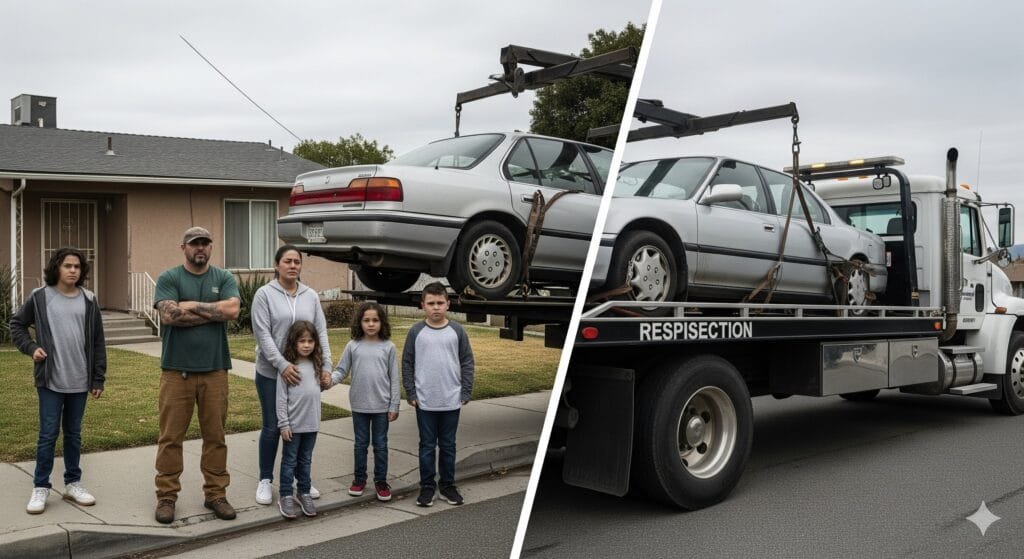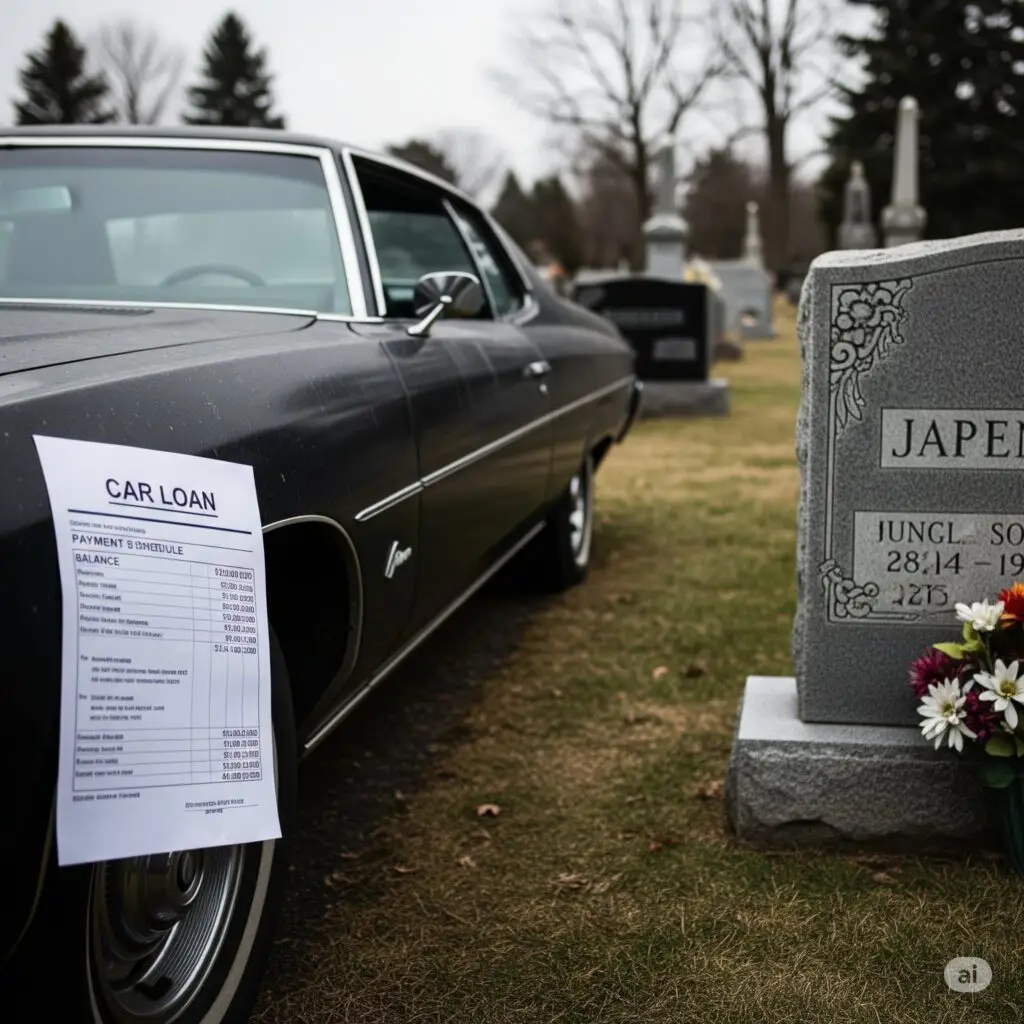Dealing with the loss of a family member is one of life’s most difficult experiences. Amid the grief, facing financial questions can feel overwhelming and confusing. A common concern that many families face is what to do about an existing car loan. Does the loan just go away? Who is responsible for the payments? Can the bank take the car?

These are essential questions, and the answers can have a significant impact on your family’s finances. The good news is that there are ways to plan and protect your loved ones from this potential burden. A special type of insurance is designed specifically for this situation: car loan insurance that pays off the debt in case of death.
This guide will walk you through everything you need to know in simple, clear terms. We will cover what happens to a car loan after death, explain how insurance can act as a financial safety net, and provide practical steps you can take, whether you are planning for the future or handling a loved one’s affairs right now.
Part 1: The Big Question: What Happens to a Car Loan When Someone Dies?
When a person with a car loan passes away, the loan does not automatically disappear. The debt still exists, and the lender (the bank or credit union that gave the loan) will still need to be paid. The car itself is the “collateral” for the loan, which means it was used to guarantee the loan would be paid. If payments stop, the lender has the legal right to take the car back.
So, who is responsible for the remaining payments? It depends on a few key factors.
The Estate: The First in Line to Pay
When a person dies, their belongings, money, and debts are all gathered into something called an “estate.” Think of the estate as a temporary financial container that holds everything the person owned. A person named in the will as the “executor” (or appointed by a court if there is no will) is responsible for managing the estate.
The executor’s job includes paying off any outstanding debts using the money and assets in the estate. This means that before any money or property is passed on to family members, the estate must first settle debts like credit card bills, mortgages, and, yes, car loans.
- If the estate has enough money, the executor can use cash from the deceased’s bank accounts to pay off the car loan completely. Once paid, the car’s title (the legal document proving ownership) can be transferred to the person who inherits it, free and clear.
- If the estate lacks sufficient funds, this is where things can get complicated. If there isn’t enough cash, the executor might have to sell other assets from the estate, like stocks or property, to pay the car loan. If there are still not enough funds, the responsibility may shift to someone else.
The Co-Signer: A Legally Binding Promise
Did your loved one have a co-signer on the auto loan? A co-signer is someone who signs the loan agreement alongside the primary borrower and promises to take over the payments if the original borrower cannot. This promise does not end with death.
If you co-signed a car loan for a family member or friend who has passed away, you are now legally responsible for the rest of the debt. It doesn’t matter who inherits the car or what the will says. Your signature on that loan document is a binding contract with the lender. If the estate cannot pay, the lender will turn to you for the full amount of the remaining payments. This is one of the most important reasons to consider car loan insurance.
Surviving Spouses and Family Members
If you are a surviving spouse or family member and did not co-sign the loan, you are generally not required to take over the payments. A debt collector cannot force you to pay for a loan that is not in your name.
However, there is a significant exception: Community Property States.
In a handful of states (Arizona, California, Idaho, Louisiana, Nevada, New Mexico, Texas, Washington, and Wisconsin), most debt taken on during a marriage is considered the joint responsibility of both spouses, even if only one person’s name is on the loan. If you live in one of these states, you may be responsible for paying off your late spouse’s car loan.
The Risk of Repossession
If no one makes the payments—meaning the estate can’t pay and there is no co-signer—the lender will eventually take action to get its money back. This is called repossession. The lender has the right to take the vehicle, sell it at auction, and use the funds from the sale to cover the loan debt.
This can be a heartbreaking outcome for a family, especially if the car is needed for daily transportation or has sentimental value. This is the exact scenario that car loan insurance is designed to prevent.
Part 2: The Solution: Insurance That Pays Off Your Car Loan
Knowing that a car loan can become a problem for your family is stressful. Thankfully, you can plan for this. There are specific insurance products designed to be a financial safety net, ensuring your loved ones can keep the car without the stress of monthly payments.
Credit Life Insurance: The Direct Payoff Plan
The most direct form of “insurance to pay off a car in case of death” is called Credit Life Insurance.
- What is it? Credit life insurance is an optional policy you can often buy directly from the car dealership or lender when you first get your auto loan. Its only purpose is to pay off the remaining balance of your car loan if you pass away before it’s fully paid.
- How does it work? It’s very straightforward. If you die, the insurance company pays the money directly to the lender, not to your family. The debt is cleared, and your family owns the car outright.
Pros of Credit Life Insurance:
- Peace of Mind: You know for sure that this specific debt will be handled.
- Protects Co-signers: It completely removes the financial risk for anyone who co-signed the loan.
- Convenience: Signing up is easy at the dealership, especially when you are already handling paperwork.
Cons of Credit Life Insurance:
- Can Be Expensive: It is often more expensive than getting a traditional life insurance policy for the same amount of coverage.
- Decreasing Value: The policy only ever pays off the loan balance. As you make payments and the loan gets smaller, the value of your insurance policy also decreases. Still, your premium payment usually stays the same.
- Limited Coverage: It only covers this one specific debt. It can’t be used for other expenses your family might have.
Traditional Life Insurance: The Flexible Alternative
Another excellent way to cover a car loan—and all your other debts—is with a standard life insurance policy, such as term life insurance.

- What is it? Term life insurance is a policy you buy for a set period (the “term”), like 10, 20, or 30 years. If you pass away during that term, the policy pays a set amount of cash (the “death benefit”) to the people you choose (your “beneficiaries”).
- How does it work for a car loan? Instead of paying the lender, the insurance company gives the money directly to your family. Your loved ones can then use a portion of that money to pay off the car loan, and they can use the rest for anything else they need, like mortgage payments, daily bills, or college savings.
Pros of Traditional Life Insurance:
- Better Value: You can often get a much larger amount of coverage for a lower monthly cost compared to credit life insurance.
- Flexibility: The money goes to your family, giving them the freedom to decide how best to use it. They might pay off the car, or they might choose to sell the vehicle and use the money for more pressing needs.
- Covers Everything: A single life insurance policy can be large enough to cover your car loan, mortgage, credit cards, and provide for your family’s future.
Cons of Traditional Life Insurance:
- Requires a Separate Process: You can’t buy it at the dealership. You need to apply for it through an insurance agent or company.
- May require a Health Check: Some policies require a simple medical exam or health questionnaire.
Debt Protection Plans
Sometimes, lenders offer something called a “Debt Protection Plan” or “Debt Cancellation” product. These work very similarly to credit life insurance but may not technically be insurance products. They are agreements where the lender agrees to cancel the remaining loan debt if you die. They often can cover disabilities as well. Always read the fine print to understand what is covered and how much it costs.
Part 3: Making the Right Choice for Your Family
Deciding between credit life insurance and a traditional life insurance policy can be tricky. Here’s a simple breakdown to help you see the difference.
| Feature | Credit Life Insurance | Traditional Life Insurance (Term Life) |
| Who Gets the Money? | The lender is paid directly. | Your family (beneficiaries) gets the money. |
| What Does It Cover? | Only the outstanding balance of your car loan. | Can be used for anything: the car, the mortgage, bills, etc. |
| How Is It Purchased? | Usually at the dealership when you get the loan. | Through an insurance agent or company. |
| Coverage Amount | The coverage amount decreases as you pay down your loan. | The coverage amount stays the same for the whole term. |
| Cost & Value | Often more expensive for the amount of coverage you get. | Generally less expensive and provides a much better value. |
Who is Credit Life Insurance Good For?
- Someone with a co-signer whom they want to protect from this specific debt.
- Someone who may not qualify for traditional life insurance due to health reasons.
- Someone who wants the simplest, most direct way to ensure the car loan is paid off, without worrying about other details.
Who is Traditional Life Insurance Good For?
- Almost everyone, especially those with a family, is affected.
- Anyone with other debts besides a car loan (like a mortgage or student loans).
- People who want to provide their family with financial flexibility and security beyond just paying off a car.
For most people, a term life insurance policy is the better and more cost-effective choice. For a small monthly premium, you can get enough coverage to pay off the car and leave a significant financial cushion for your loved ones.
Part 4: Practical Steps: What to Do Now
Whether you’re planning or dealing with a loss, here are the steps you can take.
If You Are Planning for the Future:
- Assess Your Needs: Review your car loan balance, mortgage, and other debts. Consider how much money your family would require to live comfortably without your income. This will help determine how much life insurance coverage you should have.
- Get a Term Life Insurance Quote: Reach out to an insurance agent or search online. You might be surprised at how affordable it is. For example, a healthy 35-year-old can often secure a $250,000 policy for 20 years for as little as $20 to $30 per month. This amount could easily cover your car loan multiple times over.
- Ask About Credit Life Insurance at the Dealership: If you’re buying a car, inquire about the dealership’s credit life insurance option. Compare its cost to a term life policy. For instance, if the credit life insurance costs $25 per month to cover a $30,000 loan, and a term life policy costs $30 per month for $250,000, the choice is clear.
- Tell Your Family: After creating your plan, make sure to inform your spouse or another trusted family member about it. Keep your loan and insurance details in a safe, easily accessible location.
If You Are Handling a Loved One’s Estate:
Navigating this process can be stressful. Take it one step at a time.
- Gather the Documents: The first step is to find the auto loan agreement and the vehicle’s title. This will tell you who the lender is, the account number, and the remaining balance.
- Look for Insurance: Check the loan documents carefully to see if credit life insurance or a debt protection plan was purchased. Also, look through your loved one’s files for any separate life insurance policies.
- Contact the Lender: Call the lender’s customer service department. Inform them of the death (they will likely require a copy of the death certificate). Ask them about the status of the loan and what options are available. Be clear that you are gathering information.
- Understand Your Role:
- If you are the co-signer, you are responsible. Talk to the lender about your options, which could include continuing payments or refinancing the loan in your name.
- If you are the executor, your job is to use the estate’s assets to pay the loan.
Suppose you are a surviving spouse or heir. In that case, you are not personally responsible unless you co-signed or live in a community property state.
- Decide What to Do with the Vehicle:
- Keep the Car: If you or another family member wants to keep the car, the loan must be paid. You can either pay it off with funds from the estate, use a life insurance payout, or try to refinance the loan in your name.
- Sell the Car: You may be able to sell the car to pay off the loan. If the vehicle is worth more than the loan balance, the extra money goes to the estate.
- Voluntary Repossession: If the car is worth less than the loan balance (known as being “upside-down”), and no one wants to take over the payments, you can inform the lender that the estate cannot pay and arrange for them to take the car.
Frequently Asked Questions About Auto Loans After Death
- Will an inherited car loan affect my credit score?
No. If you did not co-sign the loan, the debt does not belong to you and will not appear on your credit report. The estate is responsible. If you are a co-signer, the payment history will continue to be reported on your credit report.

- Can the bank force me to pay if I’m not a co-signer?
No, except for community property states. Debt collectors are not allowed to pressure you into paying a debt that isn’t legally yours.
- What if the car is worth less than the loan?
This is called being “upside-down.” If the estate sells the vehicle, it will still owe the lender the remaining difference. If the estate lacks sufficient funds and there’s no co-signer, the lender will likely have to accept the loss.
- How quickly do I need to act after a death?
It’s best to contact the lender within a month or two. Most lenders are understanding and will provide a grace period while the family makes arrangements. Continuing to make payments during this time is advisable, if possible, to keep the account in good standing.
- Is credit life insurance required to get a car loan?
Not. It is always an optional product. A lender cannot force you to buy it to get approved for a loan.
Protecting Your Loved Ones is the Ultimate Goal
Losing a loved one is hard enough without adding financial worries. A car loan is a significant debt, and leaving it behind can create real hardship for a family.
By understanding your options, you can make an informed choice. For a small cost, either through credit life insurance or a more flexible term life insurance policy, you can provide your family with the gift of peace of mind. This simple act of planning ensures that in a time of grief, your loved ones are left with a helpful asset, not a heavy burden.





